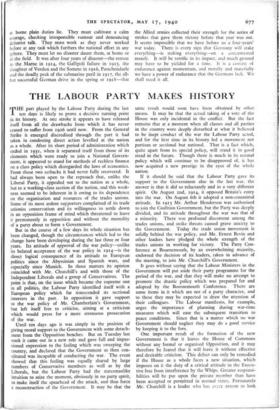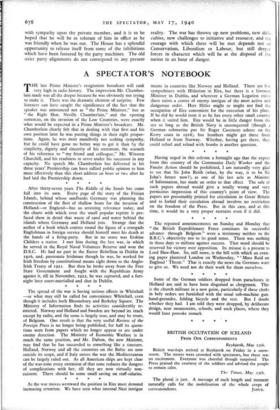THE LABOUR PARTY MAKES HISTORY
HE part played by the Labour Party during the last ten days is likely to prove a decisive turning point in its history. At one stroke it appears to have released itself from all the drawbacks from which it has never ceased to suffer from 1926 until now. From the General Strike it emerged discredited through the part it had taken in condoning direct action levelled at the nation as a whole. After its short period of administration which ended in 1931, when it separated itself from those of its elements which were ready to join a National Govern- ment, it appeared to stand for methods of reckless finance on a class policy which disregarded the laws of economics. From those two setbacks it had never fully recovered. It had always been open to the reproach that, unlike the Liberal Party, it appealed not to the nation as a whole, but to a working-class section of the nation, and this weak- ness seemed to be inherent in it owing to its dependence on the organisation and resources of the trades unions. Some of its most ardent supporters complained of its trade unionist conservatism and its willingness to settle down in an opposition frame of mind which threatened to leave it permanently in opposition and without the mentality of a party about to form a Government.
But in the course of a few days its whole situation has been changed, though the circumstances which led to the change have been developing during the last three or four years. Its attitude of approval of the war policy—unlike its belated acceptance of the war policy in 1914—is the direct logical consequence of its attitude to European politics since the Abyssinian and Spanish wars, and especially since Munich. In those matters its opinion coincided with Mr. Churchill's and with those of the Independent Liberals and a group of Conservatives. The point is that, on the issue which became the supreme one in all politics, the Labour Party identified itself with a European policy which far transcended its sectional interests in the past. In opposition it gave support to the war policy of Mr. Chamberlain's Government, but left itself free to criticise, aiming at a criticism which would press for a more strenuous prosecution of the war.
Until ten days ago it was simply in the position of giving moral support to the Government with some detach- ment from the Opposition benches. But on Tuesday last week it came out in a new role and gave full and impas- sioned expression to the feeling which was sweeping the country, and declared that the Government as then con- stituted was incapable of conducting the war. The event showed that this feeling was equally shared by large numbers of Conservative members as well as by the Liberals, but the Labour Party had the statesmanlike intuition to seize the moment, obviously in no party spirit, to make itself the spearhead of the attack, and thus force a reconstruction of the Government. It may be that the same result would soon have been obtained by other means. It may be that the actual taking of a vote of the House was only incidental in the conflict. But the fact remains that at a -moment when all classes and all parties • in the country were deeply disturbed at what it believed to be inept conduct of the war the Labour Party acted, and for the first time in its history led a movement not partisan or sectional but national. That is a fact which, quite apart from its special policy, will stand it in good stead in the future. Though there is much in its normal policy which will continue to be disapproved of, it has now acquired a new prestige in the eyes of the whole nation.
If it should be said that the Labour Party gave its support to the Government also in the last war, the answer is that it did so reluctantly and in a very different spirit. On August 2nd, 1914, it opposed Britain's entry into the war. On August 6th it adopted a non-committal attitude. In 1915 Mr. Arthur Henderson was authorised to join the Coalition Government, but the Party was deeply divided, and its attitude throughout the war was that of a minority. There was profound discontent among the trades unions, and strike threats caused grave anxiety to the Government. Today the trade union movement is solidly behind the war policy, and Mr. Ernest Bevin and other leaders have pledged the whole strength of the trades unions in working for victory. The Party Con- ference at Bournemouth, by an overwhelming majority, endorsed the decision of its leaders, taken in advance of the meeting, to join Mr. Churchill's Government.
It goes without saying that the Labour Ministers in the Government will put aside their party programme for the period of the war, and that they will make no attempt to promote the drastic policy which was prepared for and adopted by the Bournemouth Conference. There are some items in it which are not of a party character, and to these they may be expected to draw the attention of their colleagues. The Labour manifesto, for example, urges the importance of planning during war-time measures which will ease the subsequent transition to peace conditions. Since that is a matter which no war Government should neglect they may do a good service by keeping it to the fore.
One important result of the formation of the new Government is that it leaves the House of Commons without any formal or organised Opposition, and it may therefore be feared that it will leave it without effective and desirable criticism. This defect can only be remedied if the House as a whole faces a new situation, which imposes on it the duty of a critical attitude to the Execu- tive free from interference by the Whips. Greater responsi- bilities will be put upon the private member than have been accepted or permitted in normal times. Fortunately Mr. Churchill is a leader who has evcry reason to look with sympathy upon the private member, and it is to be hoped that he will be as tolerant of him in office as he was friendly when he was out. The House has a splendid opportunity to release itself from some of the inhibitions which have been fostered by the party machines. The old strict party alignments do not correspond to any present reality. The war has thrown up new problems, new diffi- culties, new challenges to initiative and resource, and the courage with which these will be met, depends not on Conservatism, Liberalism or Labour, but still deeper forces in character which will be at the disposal of the nation in an hour of danger.



































 Previous page
Previous page